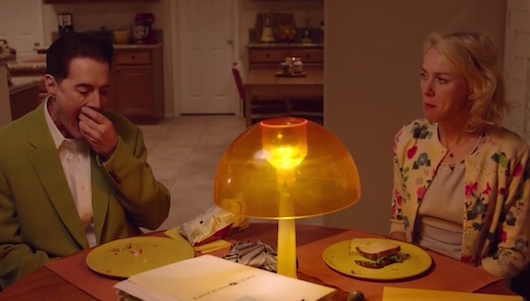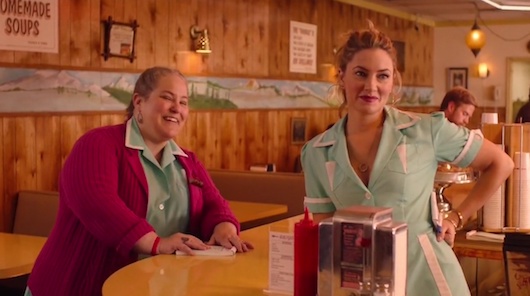 TV
TV In Which We Smell Like Last Night's Rain
 Monday, June 12, 2017 at 10:42AM
Monday, June 12, 2017 at 10:42AM This review covers episodes five and six of Twin Peaks: The Return.

Dark Women
by ELEANOR MORROW
Twin Peaks: The Return
creators David Lynch & Mark Frost
Showtime
There is a certain kind of woman that has captured David Lynch's attention over the years. She is either a blonde or a brunette, and very rarely both. Her cheekbones reverberate through her face, and speech comes as a relief for them, a momentary release from the tension that inhabits her face like a rite. Her attention is focused on something — a person, an idea — for as long as she can hold it without completely losing track of herself. In these areas Naomi Watts has always been Lynch's perfect module. She is the most brunette a blonde could ever be, and the most blonde a brunette could ever be. In comparison to Twin Peaks: The Return, the previous statement is the height of comprehensibility.
Trying to figure out what absolutely everything means in Twin Peaks: The Return is the kind of task that could take weeks, months, or even years. Imagine if they brought back Cheers and Ted Danson's character was now brain-dead. Actually, that's not that big of a stretch. Through six episodes Kyle MacLachlan remains an impotent loiterer who grabs his private parts in abject pain every time he needs to go to the bathroom. In a way, this subversion of our expectations is a brilliant joke on what most of us expected from this long-awaited revival, but in other way, it feels like a sketch that may have outlived its usefulness. Watts may as well be acting with a CGI racoon for all that MacLachlan's impotent character gives her on a scene-to-scene basis.

Fortunately this is Naomi Watts, and maybe she has never received the full adulation and appreciation she deserves as an actress. She is also the only character seemingly involved in any tangible plotline who is not an officer of the law. Watching her try to settle her husband's debts was like a lot of moments on Twin Peaks: The Return: ludicrous with a serious plausibility at its base. Despite this abstract feel, Twin Peaks: The Return succeeds on the basis of one thing which makes it completely unique and hilarious – the manner in which one human person relates to another.
Lynch is at his best in these two person scenes, when there is only one thing bouncing against another. Particularly amusing was Sheriff Truman (Robert Forster) and his verbal battles with his wife Doris (Candy Clark). It was legitimately hard to make out the coke-addled dialogue transacted between Becky (Amanda Seyfried) and her mess of a boyfriend. Each encounter between person A and person B is fresh and inimitable. This is such a different type of comedy, one that surpasses Ionesco and the stagey parodies of the original series while retaining just enough verisimilitude to keep us watching. Twin Peaks: The Return features a tone best described as merciless.

Strangely, it is the not-so opulent setting of the original that seems most diminished and diluted in this revival. The original Twin Peaks looked like it actually took place in a small Washington town. I don't know if it was a budget issue at work or what the deal is here, but the sets have not generally been up to par. When Miguel Ferrer finds Laura Dern in the warmth of a crowded bar, we see how little Lynch needs to create his specific moods, but larger set pieces are few and far between. Perhaps that can account for the lingering Las Vegas storyline, since any part of that plastique city is easily reproduced on a soundstage.
The plot, as well as I can surmise, concerns the two Dale Coopers: one is a demon, and one is a saint. This moral binary colors every individual in Twin Peaks, in Las Vegas, and in South Dakota. The only character who can be said to reside in the grey area would be the FBI agent that Lynch himself portrays. We have learned that only one Dale Cooper may live, and so soon Twin Peaks: The Return will turn into Prison Break. Maybe with only one Dale Cooper on the loose, we can finally revisit some of the loose ends of the original show.

Whatever you say about Twin Peaks: The Return, it is about as far from fanservice as anything can ever be. Fanservice reached an all-time low point when J.J. Abrams released a Star Wars movie with the exact same scenes as the previous films, only with slightly altered characters. If people could pretend to enjoy that, they would surely gobble up whatever is left of Lara Flynn Boyle writhing in a hotel room, but Ms. Boyle is mercifully missing. Lynch developed a severe distate for the dark woman when she ruined his storylines and subsequently her face through artificial maxillofacial alterations. Bringing her back and having loud fights with her on set would have been somewhat along the lines of Kylo Ren.
At least Star Wars was always empty commercialism – like Wonder Woman, it was a property strictly conceived to make money at the expense of act. Twin Peaks was mercurial and original, and to watch it surrender to the whimsies of television executives would have been a fate worse than the show originally encountered when Lynch was pressured to name the murderer of Laura Palmer against his better judgment. No matter how many old properties are callously dragged before us with many of the original actors still involved, I will always be grateful that Mr. Lynch did not cave this time.
Eleanor Morrow is the senior contributor to This Recording.















































